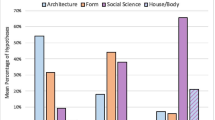Abstract
Anomie Theory, as formulated by Robert K. Merton, has been posited as a possible explanatory framework for deviancy from the norms of science.Anomie is the inability of some individuals to achieve excessively emphasized group goals through adherence to group norms. This study tests Anomie Theory by using alienation from the reward system of academic disciplines as an operationalization of this theory. Findings suggest support for Anomie Theory as an explanation for deviancy from the norms of communality, disinterestedness, and universalism. Implications for such topics as the use of norms as interpretative devices and the ambivalence of academics over compliance with dominant and subsidiary (counter-norms) are discussed. Implications for professional practice are also offered.
Similar content being viewed by others
References
Abbott, A. (1988).The System of Professions. Chicago: University of Chicago Press.
Berlant, J. L. (1975).Profession and Monopoly. Berkeley, CA: University of California Press.
Bowen, H. R., and Schuster, J. H. (1986).American Professors: A National Resource Imperiled. New York: Oxford University Press.
Braxton, J. M. (1986). The normative structure of science: Social control in the academic profession. In J. C. Smart (ed.),Higher Education: Handbook of Theory and Research. vol. 2, pp. 309–357. New York: Agathon Press.
Braxton, J. M. (1989). Institutional variability in faculty conformity to the norms of science: A force of integration or fragmentation in the academic profession?Research in Higher Education 30:419–433.
Braxton, J. M., and Bayer, A. E. (1986). Assessing faculty scholarly performance. In J. W. Creswell (ed.),Measuring Faculty Research Performance, pp. 25–42. San Francisco: Jossey-Bass.
Broad, W. J., and Wade, N. (1982).Betrayers of the Truth: Fraud and Deceit in the Halls of Science. New York: Simon & Schuster.
Carnegie Commission on Higher Education (1972).A Classification of Institutions of Higher Education. Berkeley, CA: Carnegie Commission.
Chubin, D. E., and Hackett, E. J. (1990).Peerless Science: Peer Review and U.S. Science Policy. Albany, NY: State University of New York Press.
Clark, B. R. (1963). Faculty organization and authority. In T. F. Lunsford (ed.),The Study of Academic Administration, pp. 37–51. Boulder, CO: Western Interstate Commission for Higher Education.
Cloward, R. A., and Ohlin, L. E. (1960).Delinquency and Opportunity: A Theory of Delinquent Gangs. Glencoe, IL: The Free Press.
Cole, J. R., and Cole, S. (1973).Social Stratification in Science. Chicago: University of Chicago Press.
Cole, S. (1978). Scientific reward systems: A comparative analysis. In R. A. Jones (ed.),Research in Sociology of Knowledge, Science and Art. An Annual Compilation of Research, pp. 167–190. Greenwich, CT: JAI Press.
Freidson, E. (1970a).Profession of Medicine. New York: Dodd Mead.
Freidson, E. (1970b).Professional Dominance. Chicago: Aldine.
Gatson, J. C. (1971). Secretiveness and competition for priority of discovery in science.Minerva 9: 472–492.
Goode, W. J. (1969). The theoretical limits of professionalism. In A. Etizioni (ed.),The Semi-Professions and Their Organizations, pp. 266–313. New York: The Free Press.
Hackett, E. J. (1990). Science as a vocation in the 1990s. The changing organizational culture of academic science.Journal of Higher Education 61:241–279.
Hagstrom, W. O. (1965).The Scientific Community. New York: Basic Books.
Johnson, T. J. (1972).Professions and Power. London: Macmillan.
Kadish, S. H. (1972). The theory of the profession and its predicament.AAUP Bulletin 58:120–125.
Ladd, E. C., Jr. (1979). The work of American college professors: Some data and an argument.Current Issues in Higher Education. AAHE.
Ladd, E. C., Jr., and Lipset, S. M. (1978).Technical Report 1977 Survey of the American Professoriate. Storrs, CT: Social Data Center, University of Connecticut.
Larson, M. S. (1977).The Rise of Professionalism. Berkeley: University of California Press.
Lightfield, E. T. (1971). Output and recognition of sociologists.American Sociologists 6:128–133.
Merton, R. K. (1942). Science and technology in a democratic order.Journal of Legal and Political Sociology 1:115–126.
Merton, R. K. (1968).Social Theory and Social Structure. New York: Free Press.
Merton, R. K. (1973).The Sociology of Science: Theoretical and Empirical Investigations. Chicago: University of Chicago Press.
Merton, R. K., Reader, G. G., and Kendall, P. L. (1957).The Student Physician. Cambridge, MA: Harvard University Press.
Mitroff, I. I. (1974). Norms and counter-norms in a select group of the Apollo moon scientists: A case study of the ambivalence of scientists.American Sociological Review 39:579–595.
Mulkay, M. (1976). Norms and ideology in science.Social Science Information 15:637–656.
Mulkay, M. (1979).Science and the Sociology of Knowledge. London: George Allen & Unwin.
Mulkay, M. (1980). Interpretation and the use of rules: The case of the norms of science. In T. F. Gieryn (ed.),Science and Social Structure: A Fetschrift for Robert K. Merton. New York: New York Academy of Sciences.
Reiss, A. (1973). Surveys of self-reported delicts. Unpublished paper prepared for the Symposium on Studies of Public Experience, Knowledge, and Opinion of Crime and Justice. Washington, DC.
Rothman, R. A. (1972). A dissenting view on the scientific ethos.British Journal of Sociology 23:102–108.
Schein, E. H. (1972).Professional Education: Some New Directions. New York: McGraw Hill.
Stehr, N. C. (1978). The ethos of science revisited: Social and cognitive norms. In J. Gaston (ed.),The Sociology of Science, pp. 172–196, San Francisco, CA: Jossey-Bass.
Zuckerman, H. E. (1977). Deviant behavior and social control in science. In E. Sagarin (ed.),Deviance and Social Change, pp. 87–138. Beverly Hills: Sage.
Zuckerman, H. E. (1988). The sociology of science. In N. J. Smelser (ed.),Handbook of Sociology, pp. 511–574, Newbury Park, CA: Sage.
Author information
Authors and Affiliations
Rights and permissions
About this article
Cite this article
Braxton, J.M. Deviancy from the norms of science: The effects of anomie and alienation in the academic profession. Res High Educ 34, 213–228 (1993). https://doi.org/10.1007/BF00992162
Received:
Issue Date:
DOI: https://doi.org/10.1007/BF00992162




